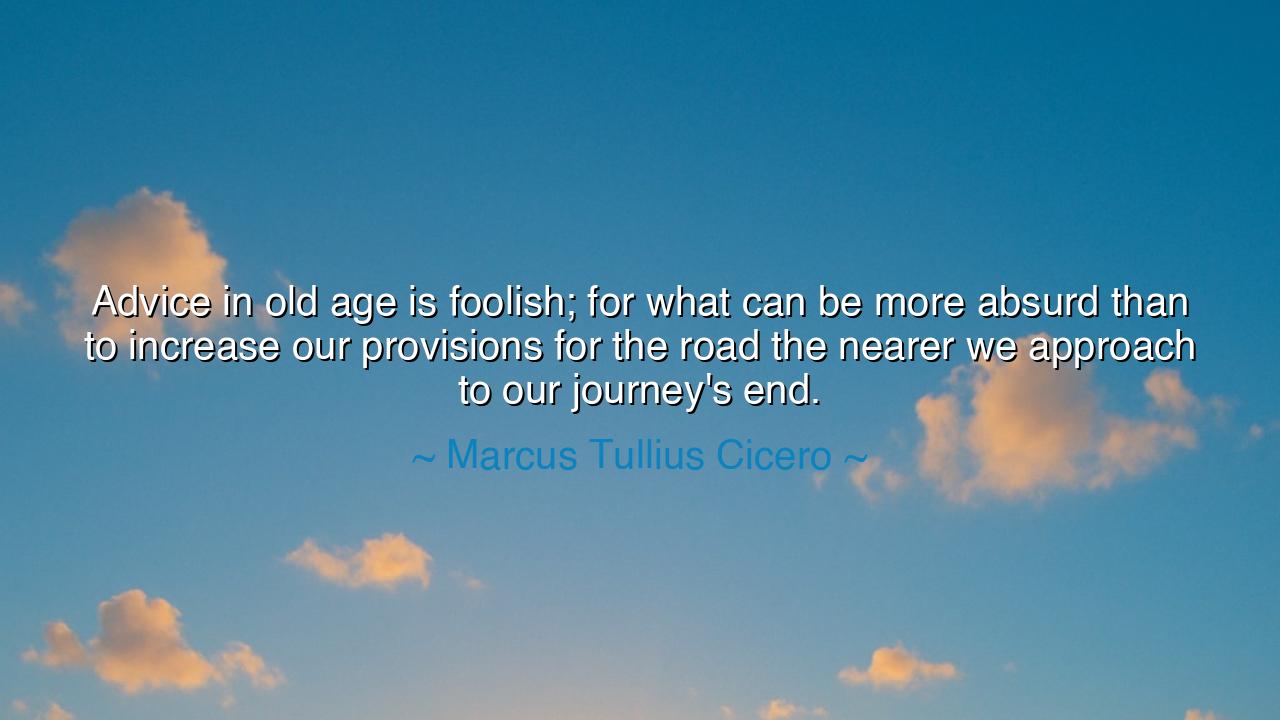
Advice in old age is foolish; for what can be more absurd than to
Advice in old age is foolish; for what can be more absurd than to increase our provisions for the road the nearer we approach to our journey's end.






"Advice in old age is foolish; for what can be more absurd than to increase our provisions for the road the nearer we approach to our journey's end." These words of Marcus Tullius Cicero are both striking and thought-provoking, challenging the very nature of preparation and wisdom in the later stages of life. Cicero, a great Roman philosopher and orator, often dealt with the themes of life, death, and the pursuit of virtue. In this quote, he draws attention to the absurdity of continuing to prepare for a future that is so close to its inevitable end. The implication is that in old age, one should focus not on gathering more material goods or planning for the future but on reflecting and embracing the present moment—to accept that the journey is nearing its end, and it is now the time to focus on wisdom and peace rather than accumulation.
The ancients often spoke of death not as something to fear but as a natural part of life that should be accepted with grace. Socrates, in his final days, famously said that death is either a blessing or a release, depending on how we face it. The great thinkers of the past believed that life’s purpose was not to endlessly gather and prepare for a future that would never come but to live with virtue, wisdom, and honor in the present. Cicero, too, understood this—he knew that the later years of life should be devoted to reflection, understanding, and, most importantly, accepting the things we cannot control. To continue to gather provisions for a journey that is nearly complete would be to ignore the wisdom that comes with age and to waste the final years that could be spent in peaceful contemplation.
Consider the example of Marcus Aurelius, the Roman Emperor and philosopher, who, despite the tremendous power and responsibility he wielded, spent his final years not accumulating more wealth or power but writing his famous Meditations. These reflections, written during his military campaigns, focused on the acceptance of impermanence, death, and the importance of virtue in daily life. Aurelius understood that the end of life was inevitable and that he had already gained all the material possessions he would need. In his last years, rather than seeking more provisions or preparing further for the journey ahead, he focused on his mind and spirit, seeking to find peace in the face of mortality.
Cicero’s quote also points to the notion of self-sufficiency in old age—the more we prepare for a future that is near its end, the less we allow ourselves to live fully in the present. When we are young, we are often obsessed with what's to come—we gather wealth, education, and material goods, believing that these will guarantee us a prosperous future. But old age—with its slow march toward death—teaches us that these things are of little value when the time to enjoy them has passed. Instead, the true wisdom of old age lies not in increasing our provisions but in learning to live with what we have, to appreciate the present, and to reconcile with the inevitable.
A modern example can be found in the life of Warren Buffett, the famed investor who, even in his old age, still focuses on the importance of simplicity and reflection. While Buffett could continue to accumulate more wealth, he often emphasizes the importance of investing in things that bring joy, peace, and meaning rather than endless material gains. His words echo Cicero’s sentiment: true wealth is not in gathering more but in learning to embrace the things that truly matter. In his later years, Buffett has chosen to spend his time wisely—reflecting, teaching, and finding joy in the simpler pleasures of life. This approach mirrors Cicero’s message that as we near the end of life, we must focus on what is truly valuable and let go of the excess.
Cicero’s wisdom challenges us all to live with purpose and awareness, particularly as we grow older. Old age should not be spent in anxiety about the future or in the accumulation of things we will never use, but in reflection and acceptance of the life we have lived. It is a time to look inward, to celebrate the experiences that have shaped us, and to live with peace in our hearts. Instead of gathering provisions for a future that is no longer necessary, we should focus on cultivating the inner peace that comes from living a life of virtue, wisdom, and gratitude.
The practical lesson here is simple but profound: don’t wait until the final years of life to seek peace and contentment. Instead of focusing on future gains, we must learn to appreciate the present moment, to reflect on what we have learned, and to share that wisdom with others. Just as Cicero warned against the folly of seeking more in the final stretch of our journey, we must turn our attention to what truly matters—our relationships, our virtue, and our inner peace. As we near the end of our journey, let us focus on living fully in each moment, embracing the wisdom of age, and finding joy in the simplicity of being.






AAdministratorAdministrator
Welcome, honored guests. Please leave a comment, we will respond soon